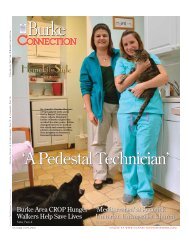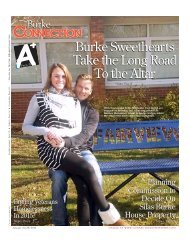Create successful ePaper yourself
Turn your PDF publications into a flip-book with our unique Google optimized e-Paper software.
Senior LivingEngaging over the New YorkerBy Marilyn CampbellThe ConnectionThere was a time when 83-year-old Bob Kanchugerspent most Friday morningson a 30-mile bike ride withfriends. The group of retirees wouldpedal toward a local destination –Bethesda, Md., to Old Town Alexandria,Va., was a favorite trek — where theywould have coffee and spirited debateson everything from foreign policy to economicinequality before making the returntrip.“One of the things that kept peoplecoming together is that we would havea defined day of riding and we wouldmake sure we had an interesting placeto stop and have coffee and discussions,”said Kanchuger, a resident of Potomac,Md., and an attorney who retired fromthe World Bank Group.While outdoor exercise was a definitebenefit, it wasn’t the best part for all ofthe group members. “The most enjoyablepart was the discussion at our midwaypoint,” said Dr. Elliot C. Wilner, aretired neurologist who lives inBethesda.Kanchuger wanted to preserve thestimulating discussions even after the bikerides were no longer possible. “It was likelythat biking would come to an end becauseof our age and physical health,” saidKanchuger. “Several of us subscribed to theNew Yorker and enjoyed discussing the articles,and that was an activity that wouldmeet some of our social needs of retirement.”So Kanchuger approached Wilner withthe idea of forming a New Yorker magazinediscussion group. They invited a few likemindedfriends from the biking group. Themen meet on the first Wednesday afternoonPhoto courtesy of Dawn LandsmanBefore the New Yorker Group, spirited discussions took place as part of theFriday morning bicycling group. Here, Tony Abroms, Dawn Landsman, MarkZweig, Elliot Wilner, Ian McDonald and Bob Kanchuger pictured in 2009.of each month for two hours of insightfulconversation. Group members choose threeto four stories from the magazine to readand analyze. Each article discussion is ledby a group member who prepares ideas foranalysis ahead of time and emails them tothe group.“I’ve gained and reinvigorated friendships,”said Wilner. “I enjoy the intellectuallystimulating discussions with bright,educated, well-informed people.”FOR THE SEPTEMBER MEETING,Wilner suggested two of James Surowiecki’sMembers enjoy intellectual stimulation,camaraderie over long term.columns. “Because they present both sidesof an important issue,” Wilner said. “CorporateAmerica has, over the past 40 yearsor so, evolved a business model that hasbeen almost totally devoted to the personalenrichment of executives and shareholders,with very little concern for the welfare ofworkers or the nation; and yet there is another,more socially conscious businessmodel that has been shown to be successfulbut is not widely emulated,” said Wilner.The men are united, in part, by their affinityfor mental rigor. “We all enjoy theintellectual stimulation, but the camaraderieis one of the best aspects,” said PeterKimm of Potomac, a retired foreign aidofficial who was for 30-years Director ofHousing and Urban Programs at the U.S.Agency for International Development.“We like each other. We’re a diversegroup of people – retired doctors, lawyers,engineers … with a ride range ofinterests. Everybody in the group is successful.”Light snacks, coffee and spirited debatescharacterize most of the meetings.“We don’t agree on everything,” said80-year-old Victor Kimm, Peter Kimm’sbrother, of McLean, Va., an engineer andretired senior executive for the EnvironmentalProtection Agency. “We’ve seenpeople who’ve had very different views,but there is a mutual respect. We havedifferent ways of looking at an issue andmoving on. I think it has something todo with the age of the group members.”Victor Kimm, who is also the executivedirector of SHARE, a non-profit organizationin McLean that helps meet theemergency needs of those with limitedfinancial resources, says the men haveexplored articles ranging from the growinginequity of income in the UnitedStates to stories about the group of Chileanminers trapped underground formore than two months.“There is a certain rigor or discipline inhaving a monthly meeting where you readand prepare in advance,” he said. “You haveto stick with it.”The bond between the men, however,extends beyond erudition.“We all greatly value the friendships ofthis group,” said Ian MacDonald, a residentof Chevy Chase, Md., a former journalistwho retired from the International MonetaryFund and who grew up in Great Britainand graduated from the University ofOxford. “And we’ve been there for eachother during difficult times.”Photo courtesy of Elliot WilnerElliot Wilner reads to his granddaughter, Yael Fritschie, who is not yet amember of either the New Yorker or bicycle group.Peter Kimm6 ❖ <strong>Burke</strong> Connection ❖ Senior Living September 2014 www.ConnectionNewspapers.com




